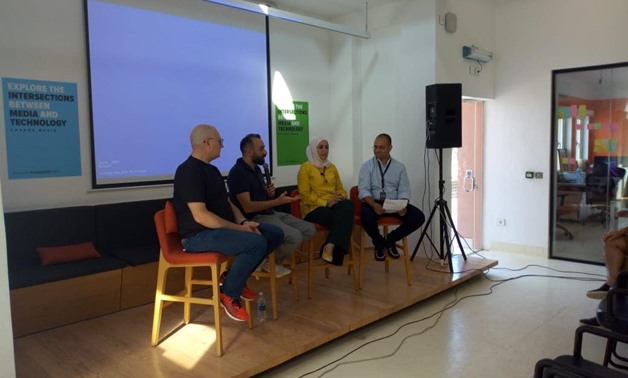
File - Amr Salama during the session.
CAIRO – 22 September 2019: Gouna Film Festival held its second CineGouna session on September 21, under the theme of “Refugee Voices in the Film Industry”, discussing the impact of filmmaking industry on seeking asylum and immigration cause.
Shaden Khallaf, Acting Head of Policy Unit in UNHCR Regional Office, shed light on portraying the lives of refugees in drama and films. Khallaf added that the Arab region produces 40% of the global rate of refugees due to regional conflicts, civil wars, armed conflicts between rival tribes throughout the region and between factions on state borders.
“The humanitarian side to Gouna Film Festival is what distinguishes it from similar festivals around the world.
It aims at delivering significant messages that blend between art and humanity, creating a unique platform centering around youth and the issues the face including, conflicts, seeking asylum, and displacement, which have unfortunately become pressing issues in our unsettled Arab region” said Thuraya Ismail,
Executive Director at Mentor Arabia Foundation.
Director Amr Salama expressed his delight at the attendance of this session, which reflects the wide awareness of the regional and global issues at hand.
On another note, Salama highlighted importance of the role of music in addressing issues of drama at a larger scope.
He illustrated the huge impact of music on global unity and cultural exchange between different nations, through the large viewership of the Korean song "Gangam Style".
Salama added that music definitely influences behavioral change, expression of feelings, ideas and ideologies, and commented on his experience with the production of one of the songs on asylum issues, saying that the team heard real stories from real refugees.
“I still remember every word narrated that day,” noted Salama, adding that such a combination of art and humanity portrays asylum and displacement issues in a way that delivers the felt experience to the audience.
Syrian actor, Qusai Sheikh Najib, expressed his delight regarding allowing the artistic works to be filmed again in Syria.He added that issues of asylum, displacement and its violent impact on humanity as a whole are the main causes he will be presenting in the upcoming period.
“Refugees have significant stories of struggle, success and resilience in all the areas to which they are displaced, and portraying them is one of the tools of psychological support for refugees,” stated Qusai.
Qusai narrated a story of a Syrian family of doctors that sought refuge in Canada, but failed to find jobs. However, they did not give up. Instead they started making home-made chocolate candy called “Salma with Chocolate”.
The product has seen large success being sold at supermarkets. One day, on his visit to the White House in America, Prime Minister Justin Trudeau tasted the cany and shared it with attendees of the meeting saying “This is what refugees make when they’re offered a chance to live in peace”.
On another note, Amin Dora, Director of "Shankaboot", the world's first Arabic web drama series, said that the series narrates the story of young Suleiman who worked as a delivery boy at a store that hired refugees.
Throughout the series, we lived every detail of Suleiman’s story. Dora said that the success of this series is due to the use of everyday Arabic language that smoothly communicated the refugees cause.
Actress Saba Mubarak talked about her experience with herseries, "Obour", which she produced and starred in, highlighting how it showcased different stories of the lives of refugees in a camp in Jordan.
Through “Obour”, Mubarak portrayed the humanitarian side of the lives of refugees, illustrating how she lived the lives of refugees themselves through their stories, and that each event played in the series beginning with script, dialogue, and stories have been inspired by true narrators.
Daniela Cicchella, Assistant Representative for Protection (UNHCR), said that the most important focus on addressing the refugee issue is talking to refugees, not talking about them, which clearly supports the principle of humanity.

Comments
Leave a Comment